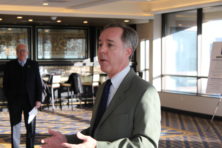Vos Open Sources Solutions for Transportation Budget Stalemate
- Share
- Tweet
- Pin
- Share
Transportation is likely the final piece of the state budget puzzle before the document hits the desk of Governor Scott Walker to be signed. Wisconsin’s biennial budget is supposed to be signed by July 1, but debate between the two state houses and the governor about transportation funding has left an impasse.
“The state Legislature has been faced with the difficult task of solving a $1 billion transportation deficit that is thwarting our ability to complete current projects and start future projects,” wrote Assembly Speaker Robin Vos to 17 of the state’s biggest users of roadways, primarily trucking companies and business associations.
In the memo, Vos asked the 17 businesses and associations to come up with their own fixes for the funding deficit. Republicans in the assembly suggested a fee on heavy trucks, which was opposed by many of the biggest trucking firms in the state, including Schneider National and Roehl Transport. Senate Republicans also came out against the heavy truck fee, in effect killing the proposal.
Vos then put the onus on those companies in opposition to the heavy truck fee. He asked that ideas for funding roads be sent in by Monday, July 10. By July 10, only two recipients of the memo had responded.
Wisconsin Manufacturers and Commerce (WMC): Wisconsin’s Chamber and broadest business association, offered more ideas to reduce spending within the Department of Transportation (DOT) than bring in revenue. Cost cutting measures included repealing the prevailing wage law, increasing gas consumption by decreasing environmental regulations on frack sand mines, reducing the number of DOT engineers and streamlining environmental review and design planning. To increase revenues, WMC suggested a five-cent gas tax increase and $25 increase in vehicle registration fees, diverting funds from a petroleum cleanup fund into road funding and allocating additional money from the general fund.
Walmart: The big box store suggested an increase in the gas tax while simultaneously removing the minimum markup on fuel. “As you are aware, gasoline consumers in Wisconsin are subject to a 9.18 percent minimum markup on every gallon purchased,” said the store in a statement. “Unlike gasoline taxes, none of the markup pays for Wisconsin’s infrastructure.” The minimum markup is implemented by the state to prevent businesses from selling a product below cost to attract customers, which is considered deceptive advertising.
Governor Walker approved $850 million in borrowing for road projects in the 2015-17 budget, likely increasing state costs in the long run. In a letter to Vos and Senate Majority Leader Scott Fitzgerald, Walker said he would reduce the borrowing proposed in the 2017-19 budget from $500 million down to $300 million while seeking additional federal funds to help make up the difference. Walker remains opposed to an increase in the gas tax or vehicle registration fees.
Republicans in the senate continue to support borrowing for transportation projects and hope to cut costs within the DOT to reduce revenue needs.
The budget is supposed to be signed by July 1 every two years. Funding levels from the 2015-17 budget cycle will carry over until a new budget is signed.



